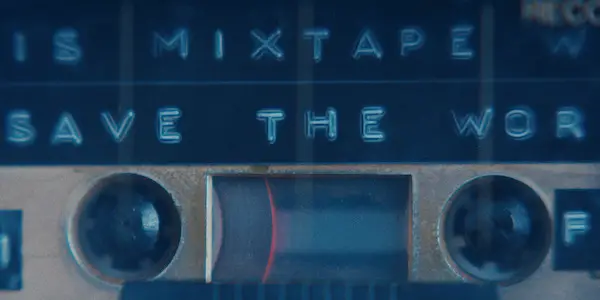Few things are more exciting than the discovery of a new, previously unknown talent, arriving in the form of a completely assured debut film. This is particularly true in the realm of science fiction, where ideas and creativity run rampant (and, if left unchecked, can occasionally lead to disastrous results). Fans of recent films such as Shane Carruth’s Upstream Color, Justin Benson and Aaron Moorhead’s The Endless, and Britt Marling’s made-for-Netflix television series The OA will surely find comfort food in Starfish, a mind-boggling, genre-bending take on the apocalypse, one filled with portals, beasties, and rifts in time and space.
There are monsters in Starfish, to be sure, but writer/director/composer A.T. White is not merely out to offer the umpteenth interpretation of a group of people struggling to survive in a desolate wasteland. No, his film is much gentler and more introspective than that, one that tackles themes of grief and isolation with surprising aplomb. Budgetary limitations ultimately prevent White from realizing his vision in full, but most of what he has crafted here truly is remarkable, with sharp technical credits to his name, plus he’s gifted with an extraordinary lead actress in Virginia Gardner, who handily carries the film with her quietly compelling performance.
Seeking a Friend for the End of the World
Former radio DJ Aubrey Parker (Virginia Gardner) has returned to her sleepy hometown to attend the funeral of her best friend, Grace (Christina Masterson). Faced with an insurmountable loss and unable to connect with any of the deceased’s loved ones, Aubrey makes her way to her former bestie’s apartment, going so far as to break in and make herself at home. Once inside, Aubrey attempts to reconnect with Grace by feeding her pet turtle and jellyfish, trying on her clothes, spying on a pair of amorous neighbors, and cracking open her vinyl record collection. She eventually falls asleep on her dead friend’s couch.
Upon awakening the next morning, Aubrey is shocked to discover that a colossal blizzard has overtaken the town. Assumed to be a freak meteorological incident, she soon learns the truth: a radio signal has been broadcast from a local station, causing a portal to open and unleash monsters on the town. Amidst all the confusion, Aubrey locates the key to fixing everything: a cassette left behind by Grace that reads “THIS MIXTAPE WILL SAVE THE WORLD.” Armed with this special piece of physical media, Aubrey braves the ruined world to broadcast her own signal, and hopefully restore harmony to the planet.

White takes his time with introductions. The entirety of the first act is devoted to the mystery that is Aubrey, left reeling from the loss of the person closest to her. Incapable of holding even the most basic of conversations, Aubrey is a soul adrift in space, struggling to find a sense of meaning in the world as she has been cast in perpetual loneliness. It’s not until the opening of the first “doorway” and the discovery of Grace’s mixtape does Aubrey become reinvigorated with a sense of purpose.
A Minor Sci Fi Miracle
With its lo-fi aesthetic and modest budget, Starfish feels right at home with many sci fi films of the last few years. If one were to squint hard enough, one could detect traces of Annihilation and The Cloverfield Paradox stitched into the narrative. The main thrust of the story revolves around Aubrey’s survival in the snowy wasteland, which takes on several asides, including a beautifully rendered animation sequence, and another where Aubrey shatters the fourth wall to witness White directing her in the very movie she’s in. Each of these digressions are more interesting than the last.
Given the minimal amount of budget White had to work with, Starfish is stunningly crafted. Cinematography by Alberto Banares is crisp, capturing the chilly atmosphere exceptionally well. The real standout is the editing. Co-edited by White and Alex Elkins, the editing has a more elliptical approach, jumping back and forth through time with grace and fluidity. Coupled with White’s fine scoring work, it lends a real hypnotic rhythm to the film.
However, all of this great work plays second fiddle to Gardner’s strong central performance. Subdued yet expressive, and capable of articulating the grandest of emotions through the softest of gestures, Gardner is fantastic, always game to go wherever White takes her. Without her, the project would almost certainly be doomed.
Starfish: Conclusion
As previously stated, White’s reach exceeds his grasp when it comes to visual effects, with computer-generated imagery ranging from passable to shoddy at times. There’s also a question of the ending, which ends almost too ambiguously for comfort. I’m actually not quite sure if White sticks the landing that he intended, but he gets so much right that it does not even matter. I eagerly look forward to whatever he does next.
What do you think? With Starfish, does A.T. White have the makings of a new visionary filmmaker?
Starfish was released in limited theaters in the U.S. on April 18, 2019, and will be released on VOD on May 28, 2019.
Does content like this matter to you?
Become a Member and support film journalism. Unlock access to all of Film Inquiry`s great articles. Join a community of like-minded readers who are passionate about cinema - get access to our private members Network, give back to independent filmmakers, and more.